I only got a few hours sleep due to the warm temperature of the room and my cold, but wasn’t too worried since we did not have a big agenda for the day: just to go into Gelsenkirchen and visit the two street addresses I had: one where Oma had lived as a girl, one that was listed on Opa’s pilot’s license for the Royal Navy dated 1919.
I took a long shower, enjoying the cool and comforting stream of water in the walk-in shower. Feeling refreshed, we went down to breakfast, which was included with our room. The dining room in the morning was just as elegant as in the evening. Luckily, we had a different server—a delightful young woman who understood what true hospitality was!
We ordered coffee and Santo ordered fried eggs, which I found out were called Spiegel Eier. Literally translated, this means “Mirror Eggs.” They were cooked in a circular pan and came out on a round plate. Perhaps the yolks were the eyes staring back at you (like a mirror)?
Platters of meats, cheeses, jams and jellies were brought to us along with a pitcher of freshly-squeezed orange juice and a basket of fresh rolls and croissants. Heaven!

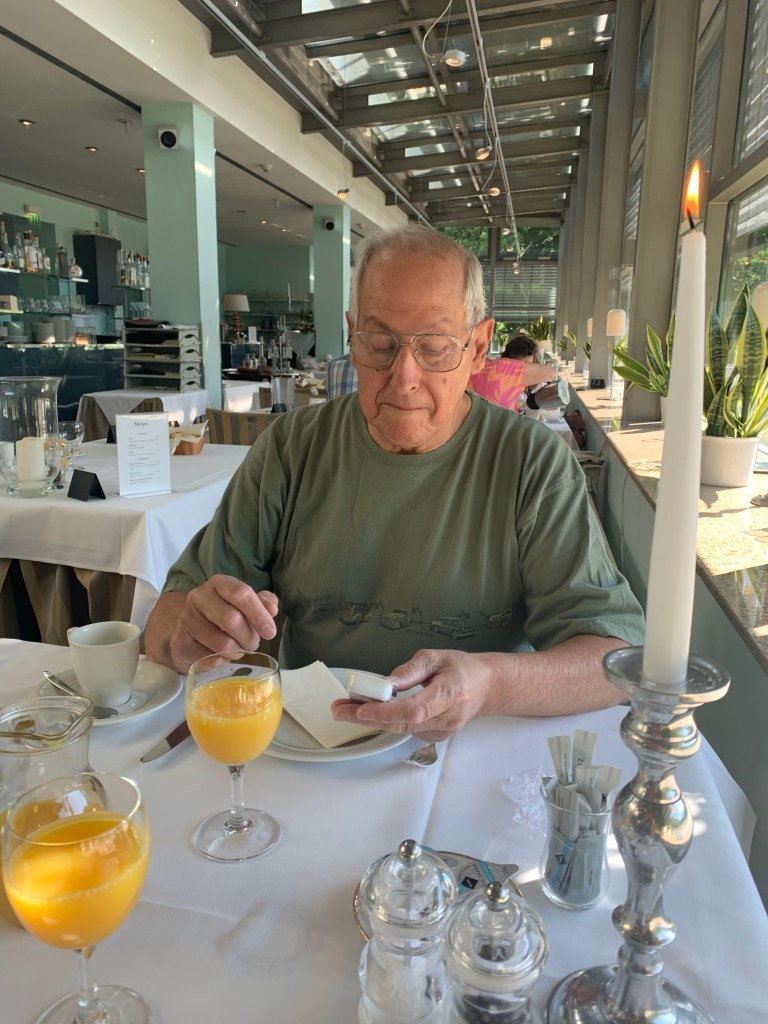
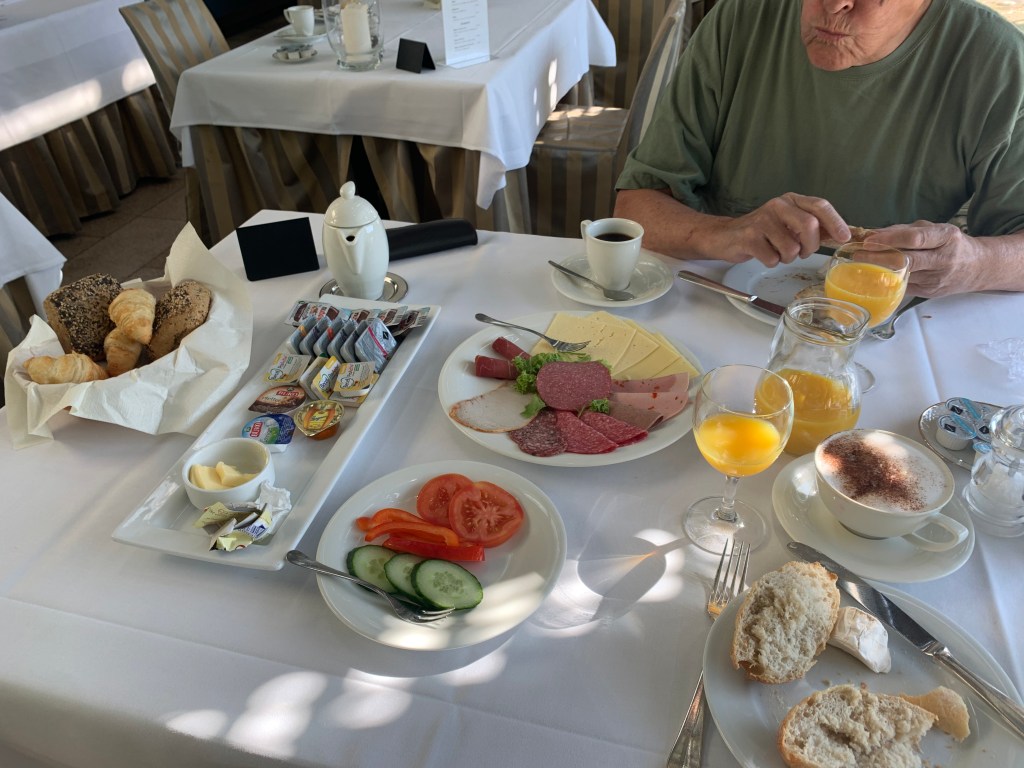
After breakfast we headed to the car. I entered an address into the car’s GPS and we headed to Gelsenkirchen. Our first stop would be Oma’s street: Feldstrasse 6. It was a short street, only one block long with five three-story buildings on each side. Some looked old, but most had probably been built in the 1960s: smooth stucco walls in muted colors, glass entrance doors, and evenly spaced windows facing the street, many with their outside metal roller blinds closed. The few that were open revealed lace curtains similar to ones I had seen in pictures of Oma’s coal company house in Scranton. There appeared to be six apartments in each building.
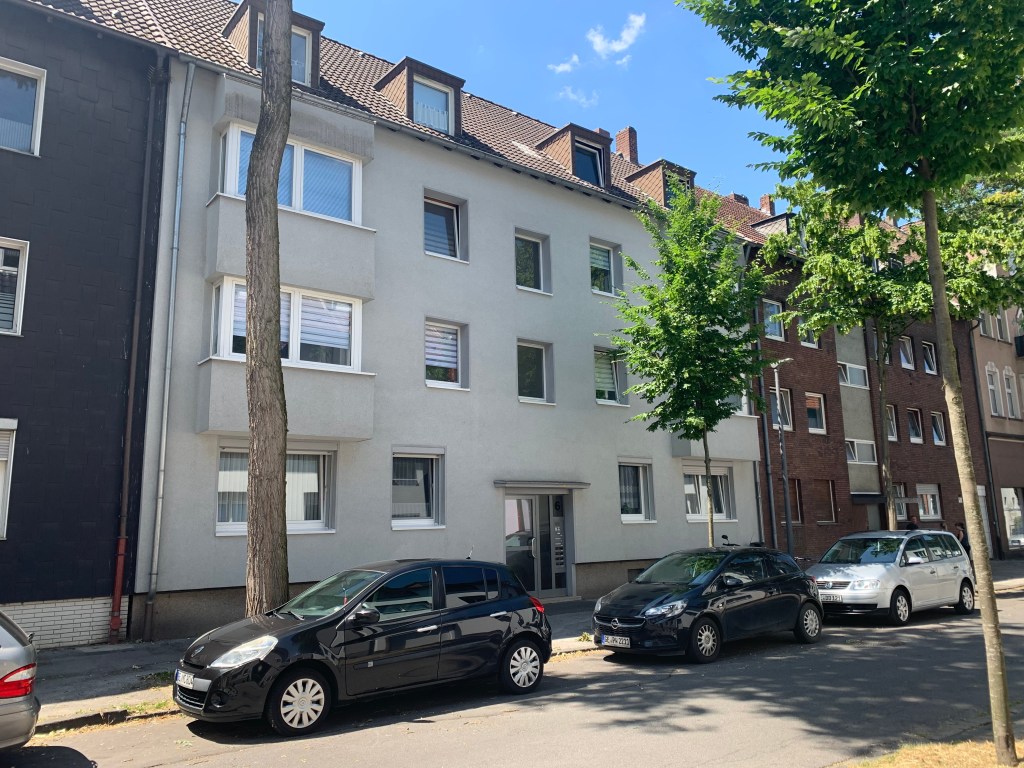


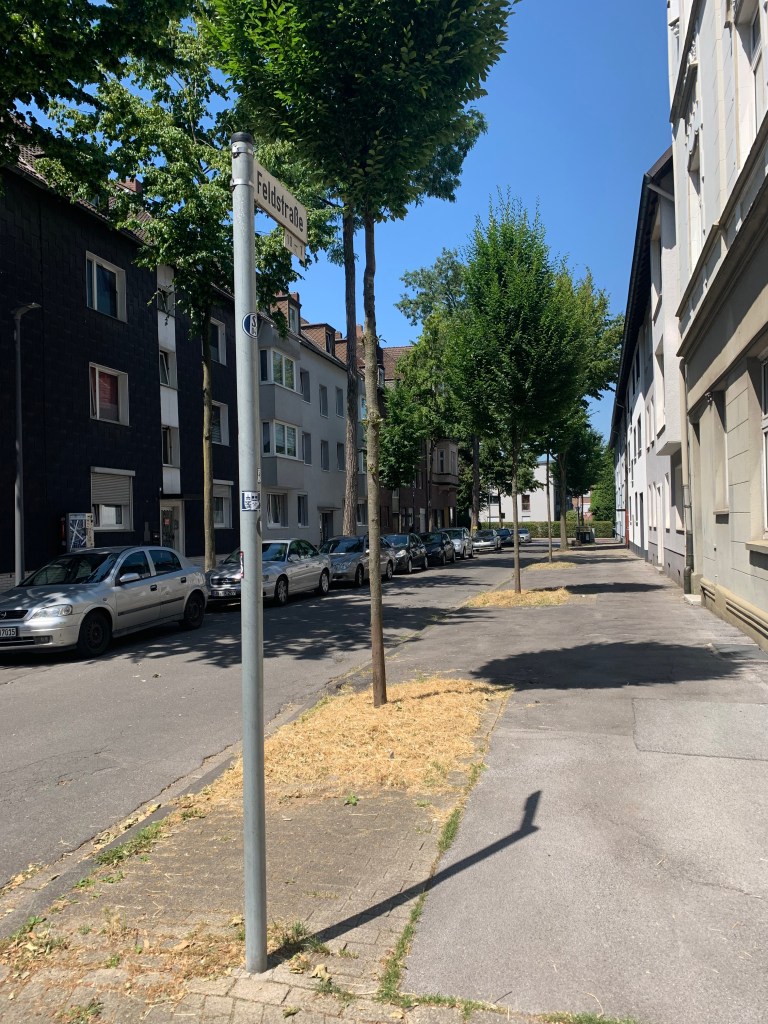
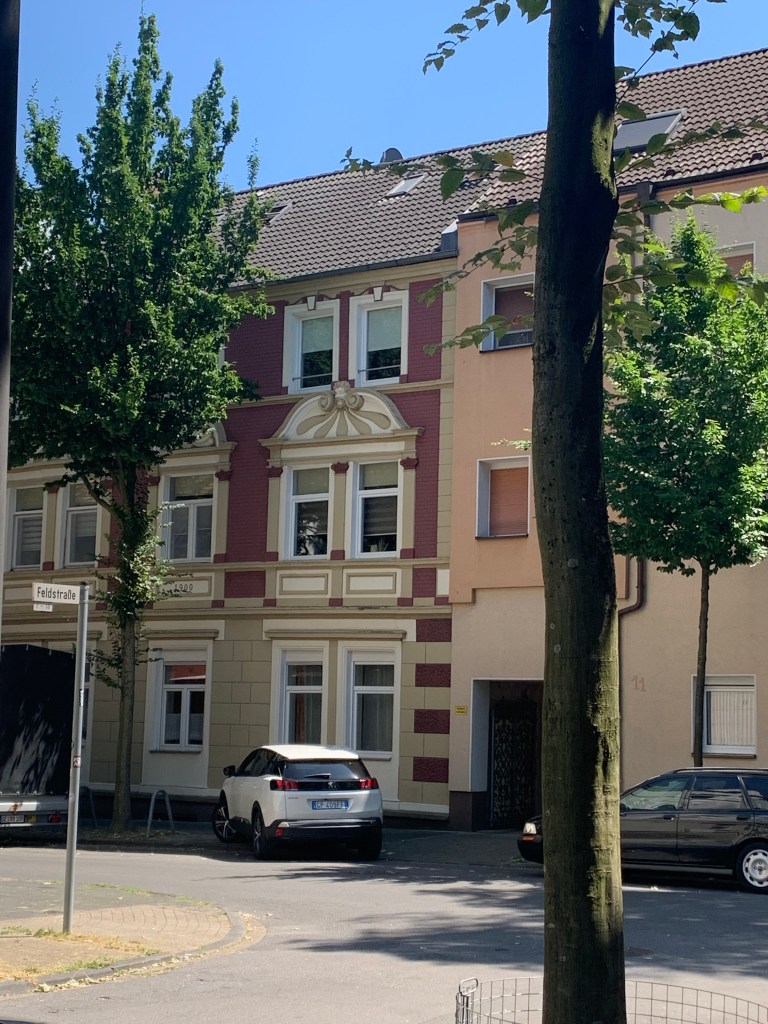
The narrow street was lined with cars on the right side where parking was allowed. Unable to find a place, Santo dropped me off and found a place just around the corner at the end of the street. He stayed in the car in case he had to move it. I walked to the sidewalk across the street from the light gray building that bore the same address as Oma’s childhood address and started to take photos. I was trying to imagine Oma walking down this street, walking to school, or to the glass factory where she worked. But I couldn’t. It was a street in a German city but I struggled to connect it to her. As I was taking pictures, a man came out of the building next door and, understandably, looked curious about what I was doing. I explained about Oma and also asked if he knew where the mines in Gelesenkirchen where Opa had worked might have been. He told me about a place called Zeche Ewald (and helped me enter it in my phone so I got the correct spelling). I thanked him warmly, glad to have made a human connection here. Somehow, it made all the difference.
It turns out that “Zeche” means “colliery.” How had I not known this? The area, Zeche Ewald, is a place where a colliery had been and two of the structures still stand–heavy, steel triangles reaching high into the sky. At their base were old brick buildings, long since abandoned. Through the broken windows, I saw more heavy steel beams. A small canal ran through one building. The structures were not like the breakers I was familiar with in Scranton, but I could see how they might serve the same purpose. Across from this was a new park. Signs indicated that the area was being repurposed to be a destination for families, bikers, etc.
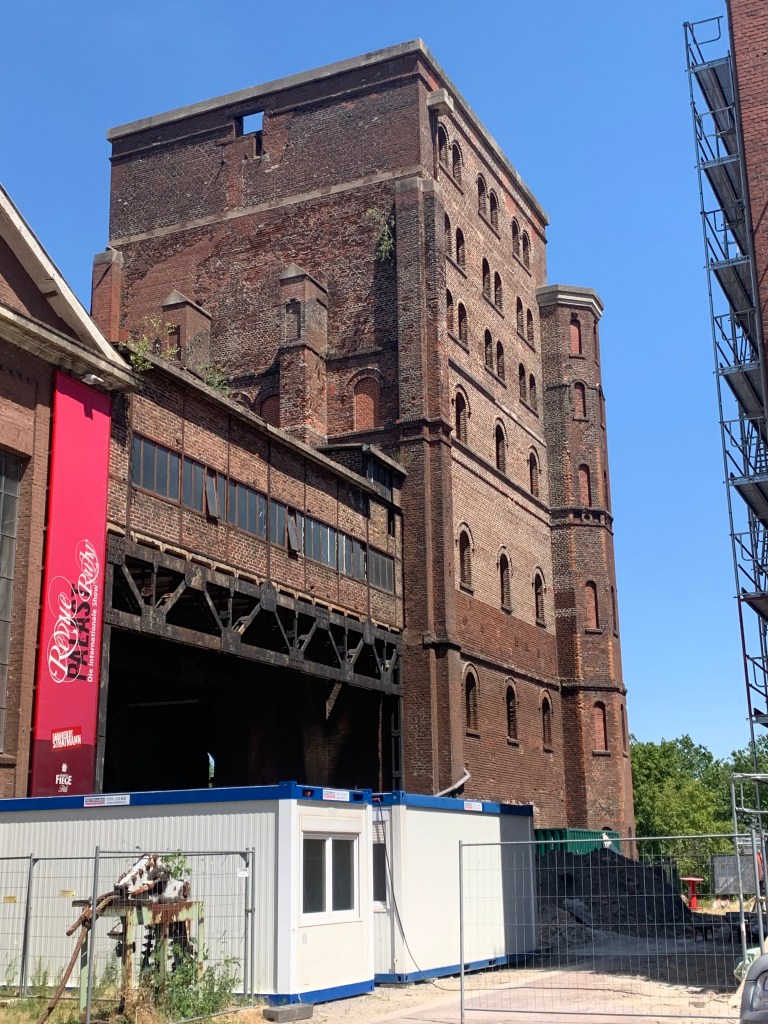

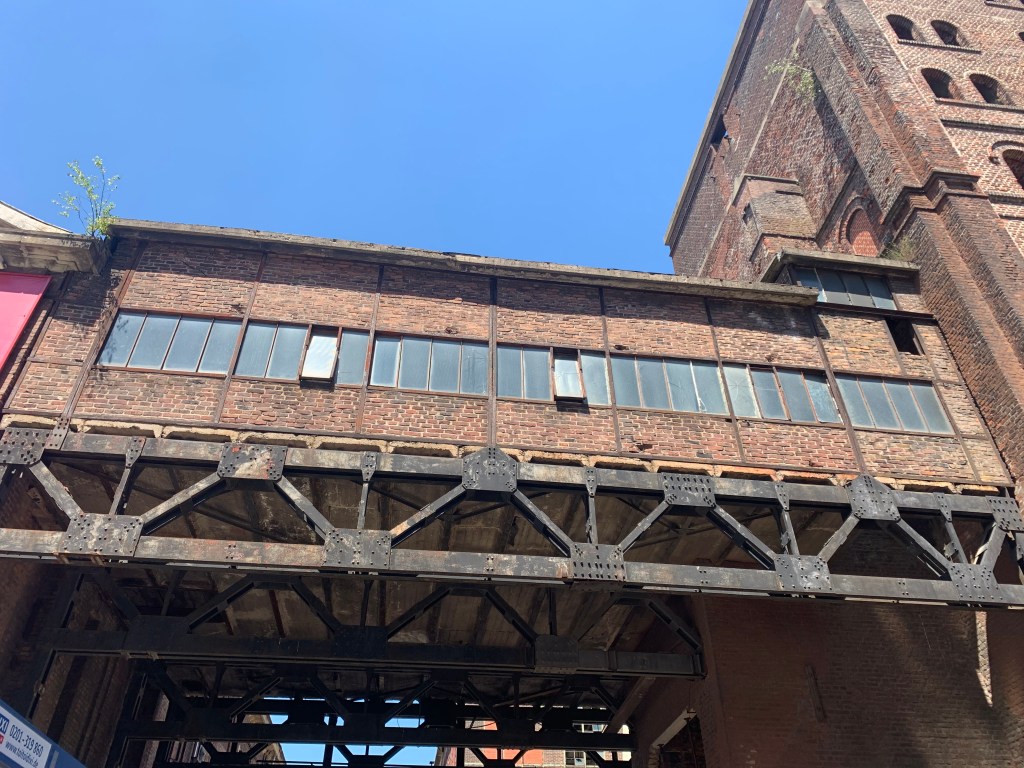


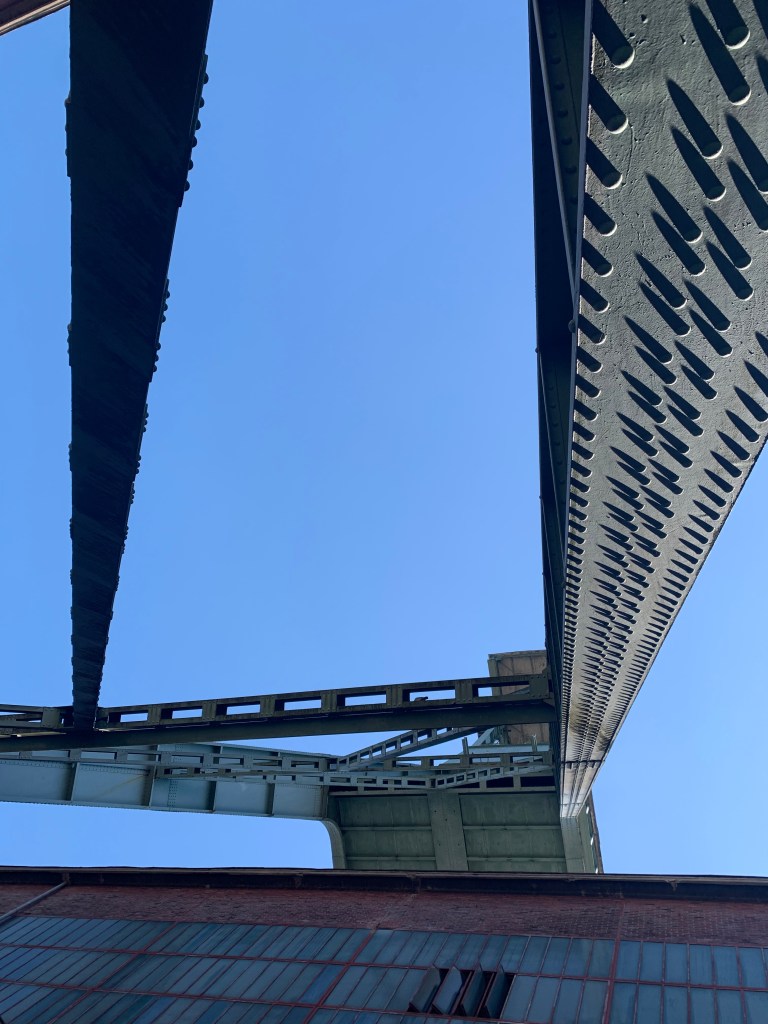
Just as the man had told me, there was a café nearby with outside seating under shade trees. We went inside and viewed all the treats in the glass cases. Santo chose a nutty cheesecake, I picked a “Schwarzwald Kuchen” (Black Forest Cake). We took our desserts and two coffees and found a table on the park side of the building. As I enjoyed this green space and wonderful food, it was hard to imagine that this may have been the place where Opa had gone underground to work in the mine.
The desserts would tide us over until dinner.
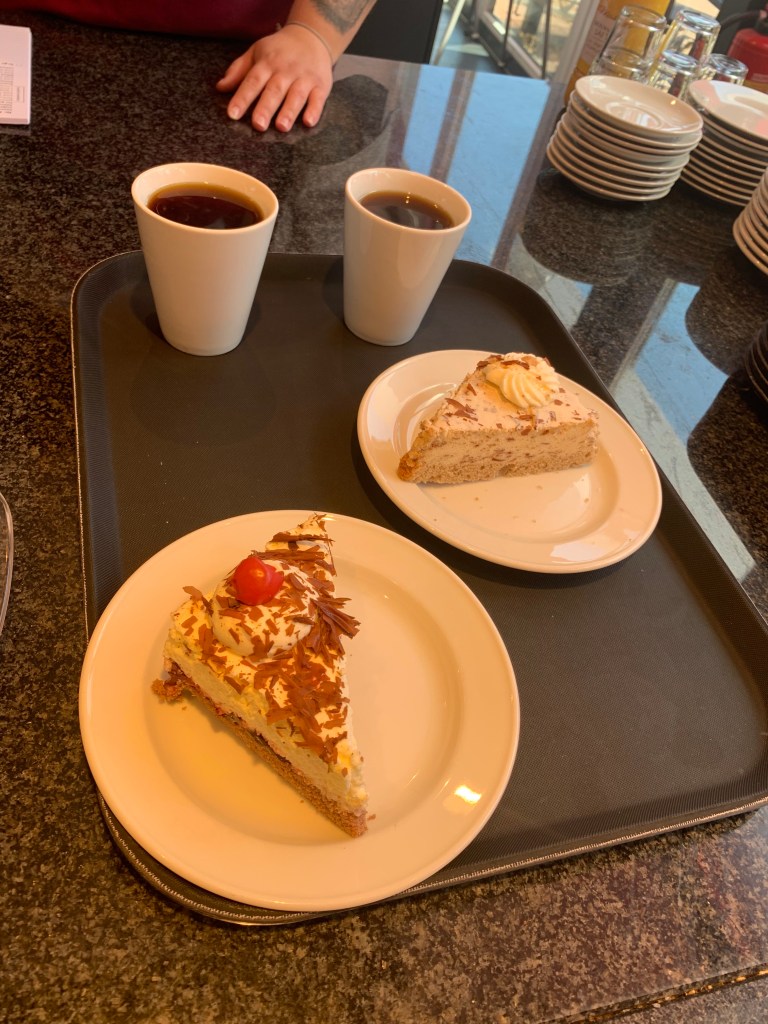
Our next stop was Elisabethstrasse 7, the address on Opa’s pilot’s license from 1919. Elisabethstrasse was closer to the city center than Oma’s street. Unlike Feldstrasse, there were no trees here. The buildings were larger and a bit more ornate, but still sat one attached to another in a long row. The building that had been Opa’s looked like one of the older buildings, but I do not know if it had been there in 1919. It now houses an Asian restaurant downstairs. I stare at the building and down the street. So many questions. So much that has been lost to history. I’m looking for something that matters, but maybe it is not here. Even if I knew this was the very same building, if I knew which apartment had been his and who he had lived with, if I knew precisely where the mine entrance had been that he entered each day, would I know him any better?



Santo was waiting outside the car when I was ready to leave. He asked me what I was feeling, sensing that there was something wrong. I paused a long time. “Honestly, I don’t know,” I said. Then Santo noticed some pigeons landing on the street and hopping along in search of food. “Look,” Santo said, “They’re looking for Opa!” Opa had raised, raced, and loved homing pigeons his whole life. “YES,” I said. “Yes, they’re looking for Opa!” I started to smile as I chased the birds, taking photos. They could feel Opa’s presence here, even if I couldn’t. In my heart, I thanked them for helping me to find him.



Earlier in the day, we had decided to go to Aldi’s (really, how could we NOT?) before returning to the hotel to purchase some things for dinner in our room or outside in the bier garten: cheese, bread, fruit, chocolate. I’m not sure if we were avoiding the waiter-from-hell, the food, or both. We both enjoyed shopping in Aldi’s, which was much nicer than the Aldi’s at home. I should say, Santo enjoyed the shopping. I enjoyed the air conditioning. Fully provisioned, we headed back to Schloss Berge. The temperature had risen, and even the outside tables in the shade offered no protection from the heat. With the fan on in our comfy room, we were able to enjoy a restful picnic dinner of our own making, along with some of the leftovers from the night before. It was perfect.
I didn’t look forward to another night battling my cough and the heat to try to get some rest. But we both did our best, still grateful for where we were and all the helpers God had put in our path. Even the pigeons!